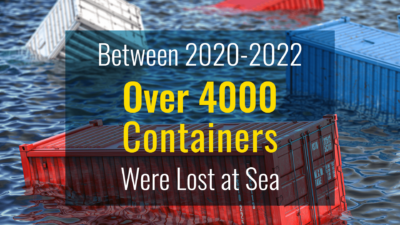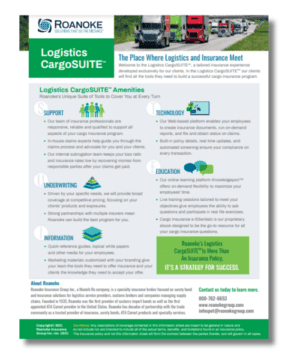September 06, 2023 | Cargo Insurance
Get the Highlights: World Shipping Council’s 2023 Report on Container Safety

On the open sea cargo losses happen. Every year, 100s of millions of cargo containers carrying goods valued into the trillions of dollars crisscross the ocean on ships. Transporting these goods safely requires proper packing, stowage, container weight, and securing of containers, but even when all these measures are carried out to perfection, containers get lost at sea. Severe weather and rough seas along with rare events such as ship groundings, structural failures, and collisions can cause significant losses.
2022 World Shipping Council “Containers Lost at Sea” Report
 The World Shipping Council (WSC) has released its annual report on containers lost at sea, revealing positive developments in container safety within the international liner shipping industry. The report covers the year 2022, showing that 661 containers were lost overboard during the year.
The World Shipping Council (WSC) has released its annual report on containers lost at sea, revealing positive developments in container safety within the international liner shipping industry. The report covers the year 2022, showing that 661 containers were lost overboard during the year.
“The reduction in containers lost at sea in 2022 is positive news, but there is no time for complacency. Every container lost at sea will always be one too many and we will continue with our efforts to make the sea a safer place to work, and to protect the environment and cargo by reducing the number of containers lost at sea,” says John Butler, President & CEO of the WSC.
Reviewing the results of the total fifteen-year period surveyed (2008-2022), on average 1,566 containers were lost at sea each year.
The Call for Improved Safety & Cargo Insurance
So far in 2023, there have been fewer incidents, but the upward trend during 2020-2021 is of great concern to the maritime industry, which is calling for improved safety measures. Every container lost is one too many. Maritime stakeholders from all parts of the supply chain have launched the MARIN TopTier project to improve container safety, with the WSC and its members as founding partners. The three-year project will use a variety of data and scientific measurements to develop and publish specific, actionable recommendations to reduce the risk of containers being lost at sea.
“Containers lost as sea represent a very small aspect of the transit of cargo, but remain a material problem for both the cargo owner, and the carrier. Looking at the overall picture, there are well over 6,900 vessels operating all around the world at any given time. In 2022 there were about 661 containers that were lost at sea; this number comprises less than 1% of the over 250,000,000 containers shipped. The objective of ocean carriers is of course, to safely deliver all containers in their care to final destination. As we know, that does not always happen. Poor loading, rough weather, and improper packing of containers all contribute to why a container goes overboard. Lost containers at sea not only harm the financial interests of the shipper and consignee, but remain a danger to all the carriers operating at sea, who have to maneuver around these floating targets. More importantly, losing even one container can be devastating to the business of the cargo owner,” said Cynthia Garbrecht, SVP Claims at the Munich Re Specialty Group N.A.
In addition to the MARIN TopTier project, WSC and its members will actively contribute to and support revision of the International Maritime Organization’s (IMO) guidelines for cargo transport unit inspection programs. WSC also supports the establishment of a mandatory reporting framework for all containers lost at sea, an issue that will be on the agenda of the IMO in September. Furthermore, the “Containers Lost at Sea Report” will now be conducted annually rather than every three years.
However, there is no silver bullet solution for extreme weather events, rough seas, and collisions. Containers and the goods they carry will be lost. The industry’s best efforts to minimize those losses requires a financial solution to carry cargo owners and stakeholders in the value of cargo past the gaps that proper planning and stowage cannot overcome. All risk shipper’s interest cargo insurance exists to shore up this gap. Cargo insurance responds to the loss, even a General Average loss, to protect against the financial loss when best practices fail to protect the goods.
Cargo Insurance Pays When the Carrier Won’t
When cargo is lost at sea, cargo owners might reasonably expect a carrier or operator who has custody of the cargo to reimburse them for loss or damage to their goods, but this is not necessarily the case. Ocean carriers are entitled to seventeen statutory defenses when a package (container) is lost or the contents destroyed while in their care, custody and control. Some of the most notable defenses include “perils, danger, and accidents of the sea or of other navigable waters” and Acts of God. This alone provides the carrier with a broad range of possible defenses, and they have even more at their disposal.
Even if none of the defenses apply, and the carrier is found to be responsible for the loss, they may still limit their liability to $500 per package (container) based on the Carriage of Goods by Sea Act (COGSA). For the cargo owner to pursue this amount through investigation and legal action, it will often cost more in time and expense than the eventual return, and the award is unlikely to fully cover the amount lost in cargo value and shipping costs. A shipper’s interest cargo insurance policy is a better solution for full financial recovery. The policy will respond regardless of whether or not the carrier was at fault for the loss or damage to cargo.
As a logistics service provider, you have the opportunity to offer your clients essential cargo insurance coverage on each and every shipment. Cargo insurance provides coverage for physical loss or damage to your clients’ goods from an external cause that occurs while the goods are in route to their final destination. Coverage will respond for losses that occur outside the carrier’s control. It pays the cargo owner for up to the full invoice value of cargo lost or damaged plus freight and other costs. It will also pay for the costs to minimize losses that have occurred, costs such as salvage and debris removal or to relocate cargo that is in danger of further loss. As with all insurance, coverage is subject to policy terms and conditions.
Roanoke provides the tools and resources logistics service providers need to build a successful cargo insurance program.
Please contact us at 1-800-ROANOKE (866-934-8174) or download our Logistics CargoSUITE brochure to learn more.
Data provided by the World Shipping Council Container’s Lost at Sea Report 2023 Update
Disclaimer: The descriptions of coverage described above are generalized and are subject to the specific policy’s terms, conditions and exclusions. For full coverage details, please refer to the actual policy forms. This content is not an offer of insurance nor does it provide insurance coverage to the reader.






